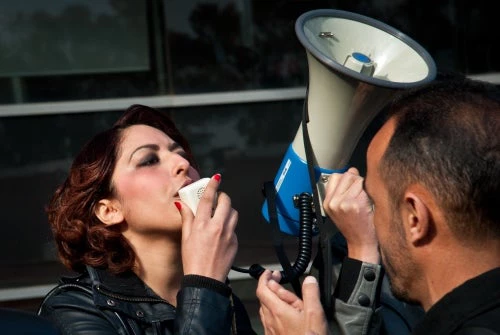 The political participation of Arab women in post-revolutionary Arab countries has been the subject of various studies and academic research.
The 2011 revolutions marked a significant shift in the female political role in the region because women were involved at the head of the Arab uprisings. The revolutions, which were initially secular and egalitarian, also unleashed long-repressed conservative forces, which have been eating in to the gains made by Arab feminists over the past decades.
The political participation of Arab women in post-revolutionary Arab countries has been the subject of various studies and academic research.
The 2011 revolutions marked a significant shift in the female political role in the region because women were involved at the head of the Arab uprisings. The revolutions, which were initially secular and egalitarian, also unleashed long-repressed conservative forces, which have been eating in to the gains made by Arab feminists over the past decades.
From euphoria to disenchantment
So how have women fared after the Arab Spring?
According to the World Economic Forum’s latest Gender Gap Report (2015), the Middle East and North Africa (MENA) region ranks at the bottom in terms of indices for women’s political participation and empowerment. In the MENA region, women hold just under 13% of parliamentary seats , and in most countries, structural barriers such as discriminatory laws and institutions still limit the options women have to participate in politics or run for office. In Saudi Arabia, women are only able to vote in local elections , a right acquired in just 2011 and with strict conditions.
Quota systems—or affirmative action— to boost women’s political empowerment have proved successful in at least increasing the proportion of women represented in Parliament. In countries like Tunisia, Morocco, or Lebanon, quotas have been the main drivers of women’s representation in Parliament. However, in Egypt, the number of women represented in parliament remains as low as 2% , with the exception of specific periods of time when female quota systems were adopted (in 1979, 1984, and 2010).
While these examples demonstrate the usefulness of affirmative action, one could argue that the lack of a favorable environment for effective female political participation will continue to hinder the number of women represented in politics, and therefore their political credibility and weight.
There are a few exceptions of women who have succeeded in breaking the political glass ceiling, like Hala Shukrallah, leader of the Egyptian Dostour Party; Louisa Hanoun, head of Algeria’s Workers’ Party; and Nabila Mounib, the secretary-general of Morocco’s Unified Socialist Party.
In the Gulf countries where women's representation remains marginal, the political sphere has seen some recent positive developments. In the United Arab Emirates, Amal Al Qubaisi became the first female speaker of the House and seven women have been nominated in the latest cabinet. In Saudi Arabia, women took part for the first time in municipal elections held last December and many female candidates won municipal seats.
But the wider reality shows that, in the Arab world, men continue to dominate the political arena . That this remains the reality is something one could hardly challenge.
Why women's political participation matters for development?
Every year, on March 8 th, Arab newspapers, magazines, and other media talk about women’s inclusion. Cynical minds will view it wishful thinking if there’s no real political will for greater equality and better female representation in political dealings. Like all other human rights-related debates in the region, the debate on women’s rights has become one of secondary importance in the face of more urgent concerns, such as security, public safety, and the threat of terrorism. The voices of feminists across the region go almost unheard at a time when countries are struggling with their weak economic performance, plunging oil prices, and social unrest.
Women’s weak participation in public life in MENA, rooted in social and cultural norms, contradicts the ability they have to be leaders and agents of change demonstrated throughout the Arab world’s history. From a development standpoint, the participation of women is essential to be able to build and sustain stronger economic and political systems. It matters to include the female perspective in political decision-making.
Building effective participation in MENA calls for more institutionalized patterns of participation for women in the political sphere as decision makers. It also requires more effort to alter people’s mentality towards women’s role in public life, and sow the seeds of a more egalitarian culture in schools to the media and parliament. Individual women, such as Hala, Louisa and Nabila, have overcome political discrimination and other obstacles with great acclaim, but for Arab women as a whole, a more level playing field will need to become a reality, and not just something that is only wished for.


Join the Conversation